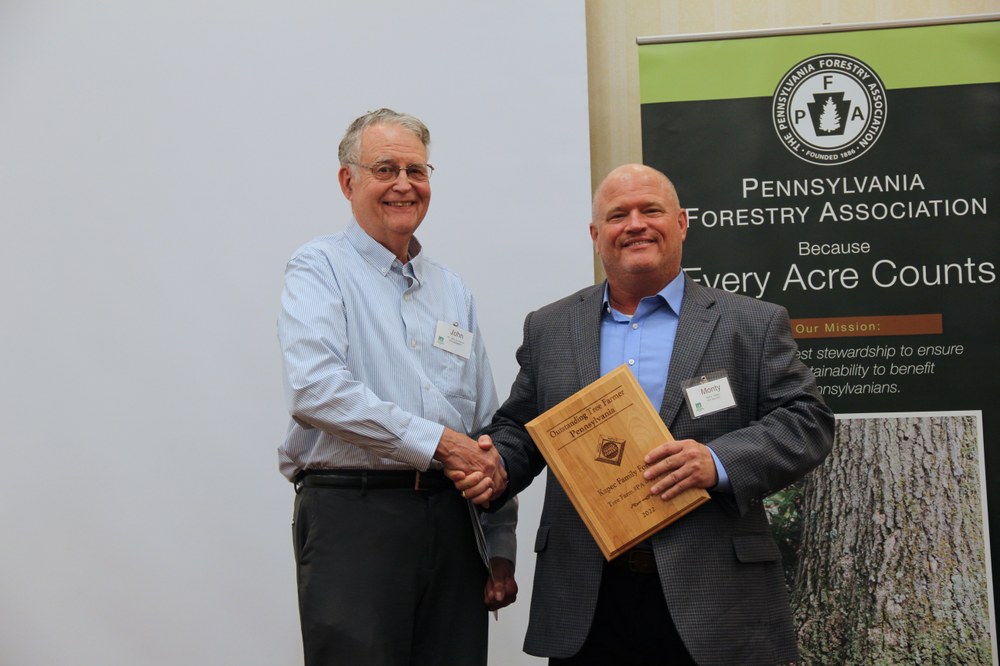Posted: February 9, 2023

Owner Monte Kapec, right, receives the 2022 PA Tree Farm of the Year award for The Camp at Elk Tannery from 2022 PA Tree Farm Committee Chair John Hoover.
By Susan Benedict, PA Tree Farm Committee Chair
As I write this, I have just finished watching the beavers who live in the pond in front of our cabin work at repairing the damage to their dam from the latest flooding rainstorm. This is the fifth repair they have undertaken since moving in. It has been a joint effort, with us providing some of the materials they have used. I’m sure they are hoping this will be the last fix for a while, but somehow, I doubt it. Yet, every time they repair it, the dam becomes secure and the water level more stable. I feel like our PA Tree Farm committee is somewhat like our dam. On January 1, 2023, I stepped into the PA Tree Farm committee chair. I have been here before. My previous tenure saw the end of the American Tree Farm System (ATFS) Tree Farm Convention, with the last being hosted by our state committee in Pittsburgh, PA. After that convention, ATFS combined it with the annual National Leadership Convention. We were sad for this change but understood that two annual conventions put a strain on ATFS staff and financial resources that could be better used for core mission purposes. Then came the dreaded States Voice, States Choice, where state committees were tasked with choosing from a menu of programs the state committee felt best suited their needs and developing the operating documents for their specific program while becoming more self-reliant financially. This was a huge undertaking and not without angst and frankly some discord among the members. As with any change, there were differing viewpoints on how to proceed, and arriving at a consensus was difficult. The PA Tree Farm committee did arrive at a consensus and two things were decided. We would become a certification program—subject to third-party auditing to prove compliance with published standards—and we would re-engage with the Pennsylvania Forestry Association as a PFA standing committee to stabilize our finances and gain administrative support. I firmly supported both of these moves. In order to implement the new States Voice, States Choice certification program, we instituted dues for the first time. Each Tree Farm was required to be a PFA member and pay PFA annual dues, and a separate Tree Farm-specific assessment was added to offset Tree Farm program expenses. PFA was generous with its support, and we were able to keep the fees low. No one likes to pay fees, but it costs money to run a program and the Tree Farm committee needs to pay its way. When reorganized, our committee set a goal of inspecting each Tree Farm every five years. This was an ambitious goal. So far, we have not been able to attain it. There are many reasons for this which are outside the scope of this article. In addition, ATFS sends a list annually of required Tree Farm inspections to maintain the integrity of the program, and since we are a certification program, we have periodic audits. These audits are rigorous and require many hours of administrative time, most of it volunteer. As time has passed and the world has changed, especially with COVID, it has become increasingly difficult for the PA Tree Farm committee to assemble the hands to complete the audits. The audit in 2022 was especially difficult for committee members to complete. Realizing a change was needed, committee leadership began discussing moving to a recognition program. The program has the same plan and inspection requirements but does not have the audit component. After some initial discussion, the committee sent a survey to Tree Farm members asking their opinion on the change. The overwhelming response was to change to a recognition program. I support this change. Certification may be important to some of our members. For those members, we will help research options for them, but for the vast majority of our members, recognition achieves the same goals of forest stewardship. It should be noted here that the current fee structure and required PFA membership will remain. Those fees support our normal inspection operations. We have worked to increase our inspector cadre and will be moving toward achieving our “every member inspected on a five-year schedule” goal. In addition, committee members are reaching out to ATFS to suggest some changes to make the program work better for PA Tree Farms. We will report more on this effort as we make progress. Like the beavers in my pond, I hope this is the last major “repair” we need to make to the PA Tree Farm committee’s operations. I doubt it will be, but we will continue to work for our PA Tree Farmers to have a program that supports their valiant stewardship efforts to maintain Penn’s Woods.
For more information about the PA Tree Farm program, visit their webpage at www.paforestry.org/treefarm.
James C. Finley Center for Private Forests
Address
416 Forest Resources BuildingUniversity Park, PA 16802
- Email PrivateForests@psu.edu
- Office 814-863-0401
- Fax 814-865-6275
James C. Finley Center for Private Forests
Address
416 Forest Resources BuildingUniversity Park, PA 16802
- Email PrivateForests@psu.edu
- Office 814-863-0401
- Fax 814-865-6275

